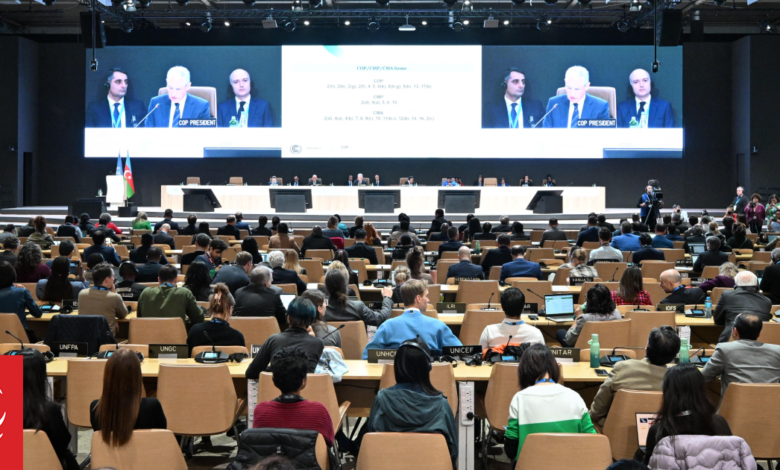COP29 deal disappoints Kiwi climate activists

COP29 President Mukhtar Babayev speaks at a first closing plenary of the COP29 Climate Conference in Baku on 23 November, 2024.
Photo: AFP
The world’s least-developed nations have reacted angrily to the deal reached at the COP 29 climate summit – and New Zealand campaigners say they have a point.
At the summit, in oil-rich Azerbaijan, a spending target of $300 billion (NZ$514b) a year was agreed on to help poorer countries – many of which have contributed very little, per capita, to emissions – deal with the impacts of climate change.
It replaces a previous commitment of US $100 billion (NZ$171b) per year, a target which rich countries only met in 2022, two years behind schedule.
Though agreed to, the new deal did not please everyone.
“This document is nothing more than an optical illusion,” Indian climate change negotiator Chandni Raina said. “This, in our opinion, will not address the enormity of the challenge we all face. Therefore, we oppose the adoption of this document. India opposes the adoption of this document.”
But developing nations had asked for about three times more – nearly NZ$2 trillion annually.
Oil Change International campaigner David Tong was at the summit.
“It’s less than half a percent of the OECD nations’ GDP per year,” he told Morning Report on Monday. “It’s not even half of what the UN’s high-level expert group estimates will be needed per year for mitigation and adaptation in developing countries by 2030. And the target only comes into effect in 2035.
“In a decade of attending the UN climate negotiations, this was the toughest COP I’ve ever been to and came closer than I’ve ever seen to breaking down to no agreement.
“Countries came with such vastly different expectations. The US was not willing to move on the quantum – and more importantly, on the quality – of money offered. The US refused to put in what was called a public finance core, a commitment of how much money would actually come from governments.
“On the other hand, developing countries were calling for a mobilisation target – a target of money mobilised, moved by rich countries – of over US$1 trillion (NZ$1.75t). That gap was huge and the presidency did nothing to address it.
“There were over 1770 fossil fuel lobbyists attending the negotiations, and it did not until the very, very end, look like a compromise would be achieved.”
Tong said “extraordinary common ground” was found in 2015 in Paris, though rich nations lagged on meeting their promises. But despite the apparent progress, he said the new deal was not as good as it looked – “less inflation-adjusted than the $100 billion promise made in 2009”.
And the future was looking grim, with “bad” geopolitics – the Trump presidency, in particular – threatening to derail future efforts. In his first term as US president, Donald Trump pulled the US out of the Paris Agreement, a move later reversed by Joe Biden.
Climate Change Minister Simon Watts said he was unable to speak to Morning Report because he was travelling.

Simon Watts.
Photo: RNZ / Samuel Rillstone
Kiwi activist Cindy Baxter, who was also at the conference in Azerbaijan, said rich countries were giving more money to fossil fuel companies than poorer nations. Funds were given to “various groups” she said, including the World Bank and the UN’s Green Climate Fund, and dispersed from there.
“A lot of the small island states in the Pacific have had an awfully difficult time trying to draw down money from those funds because the criteria are are so high and it’s very difficult to actually access those funds,” she told Morning Report.
And rich countries were also not cutting emissions.
“So they’re not giving out the money and they’re continuing to contribute to the problem that’s causing climate change.
“At the very base of all of this is climate science, and it’s absolutely clear that, you know, we are hurtling towards climate chaos.
“We’ve seen it here in Aotearoa with Cyclone Gabrielle the most recent example, you’ve seen it across the world with devastating floods and cyclones and I mean, the Philippines had four typhoons in 10 days. That’s just unheard of, and this is just the beginning. We really have to get across this, and I think getting the fossil fuel industry out of the way is probably a very good, would be a very good step.”
The new carbon trading regime was an improvement, she said, but it was still a “wild west”.
“It’s quite concerning, especially for New Zealand when we’re, we, we’re a real standout in the global and global trends by wanting to meet two thirds of our target through international carbon trading. Nobody else comes close to what we’re planning… we should actually be focusing on cutting emissions at home, that is the most important thing. You can’t rely on other people to do your work for you.”
New Zealand dropped seven places in an international climate change league table, to 41st place, last week.
Sign up for Ngā Pitopito Kōrero, a daily newsletter curated by our editors and delivered straight to your inbox every weekday.


